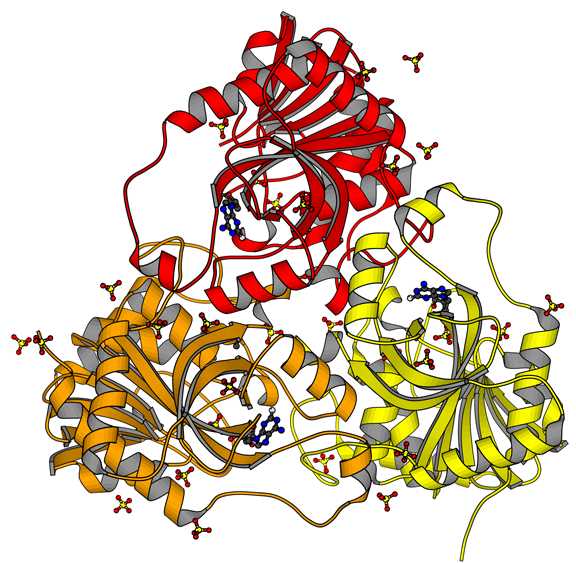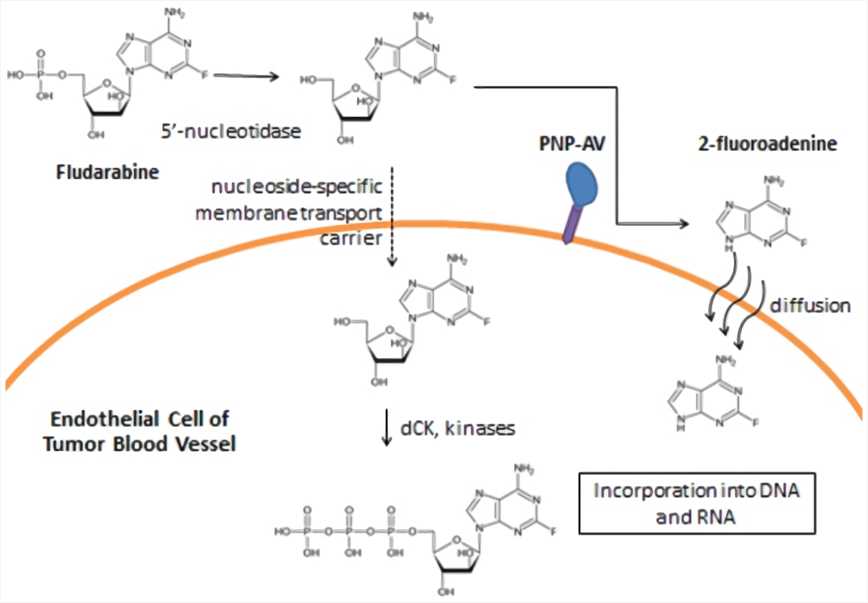Antibody-purine Nucleoside Phosphorylase Conjugate
As a world leader in antibody-drug conjugates (ADCs), Creative Biolabs provides professional antibody-directed enzyme prodrug therapy (ADEPT) development services for customers. We offer the antibody-purine nucleoside phosphorylase conjugate for clients with optimized enzyme and conjugation strategies to promote your ADEPT development.
Purine Nucleoside Phosphorylase
Purine nucleoside phosphorylase (PNP), also referred to PNPase or inosine phosphorylase, is an enzyme that in humans encoded by the NP gene. Together with phosphate, purine nucleoside could be catalyzed by PNP to become purine and alpha-D-ribose 1-phosphate. PNP metabolizes inosine into hypoxanthine and guanosine into guanine in purine metabolism, in each case producing ribose phosphate. A nucleoside can be cleaved to produce a nucleobase and ribose 1 phosphate by nucleoside phosphorylase through phosphorylating. What’s more, it is also involved in nucleotide salvage pathways. Nucleotide monophosphates will be produced in these pathways when the de novo synthesis pathway is interrupted or non-existent.
 Fig.1 The structure of human PNP.
Fig.1 The structure of human PNP.
MOA of PNP
PNP enzyme catalyzes the cleavage of prodrug fludarabine and thus yields the parent drug 2-fluoroadenine. 2-fluoroadenine is the nucleoside analogues which acts as pseudo-substrates in biochemical reactions. Studies have shown that it has the ability to inhibit DNA replication by inhibiting enzymes involved in the de novo synthesis of nucleotides. In addition, the nucleoside analogues can be incorporated into DNA and RNA, interrupting the extension of DNA and RNA chains. Finally, it inhibits enzymes involved in the nucleic acid syntheses, such as DNA polymerase and nucleic acid reductase, thereby inhibiting DNA replication synthesis and repairing of nucleic acid macromolecules.
 Fig.2 PNP-AV mechanism of action. (Krais, 2013)
Fig.2 PNP-AV mechanism of action. (Krais, 2013)
Antibody-purine Nucleoside Phosphorylase Conjugate-based ADEPT
Purine nucleoside phosphorylase is used as the enzyme in PNP conjugate-based ADEPT to active a prodrug to accomplish tumor cell killing. In the past study, an antibody-PNP-AV fusion protein combined with an enzyme prodrug therapy has been used for the treatment of breast cancer. Results have shown that the binding stability and cytotoxicity of the PNP-AV enzyme prodrug therapy. Cytotoxicity can be specific localized to the site of tumor through a protein fusion of purine nucleoside phosphorylase (PNP) and annexin V. Furthermore, PNP enzyme could convert the fludarabine into 2-fluoroadenine which is a more cytotoxic form.
Creative Biolabs is dedicated to helping customers develop ADEPT based on PNP. Prodrug-linker complexes are performed using customized linkers in a cost-effective and timely method. Please contact us for more information and a detailed quote.
Reference
- Krais, J. J.; et al. Purine nucleoside phosphorylase targeted by annexin v to breast cancer vasculature for enzyme prodrug therapy. PLoS One. 2013, 8(10), e76403.
For Research Use Only. NOT FOR CLINICAL USE.
- Antibody-carboxypeptidase G2 Conjugate
- Antibody-carboxypeptidase A Conjugate
- Antibody-β-glucuronidase Conjugate
- Antibody-β-lactamase Conjugate
- Antibody-cytosine Deaminase Conjugate
- Antibody-nitroreductase Conjugate
- Antibody-alkaline Phosphatase Conjugate
- Antibody-penicillin Amidase Conjugate
- Antibody-carboxylesterases Conjugate
- Antibody-alcohol Dehydrogenase Conjugate
- Antibody-glycosidases Conjugate
Related Sections
Antibody-enzyme Conjugates for Cancer Therapy:
Welcome! For price inquiries, please feel free to contact us through the form on the left side. We will get back to you as soon as possible.
Contact usUSA
Tel:
Fax:
Email:
Europe
Tel:
Email:
Germany
Tel:
Email:

